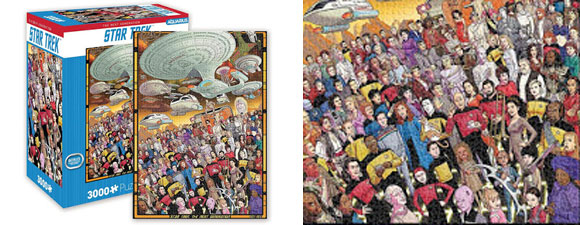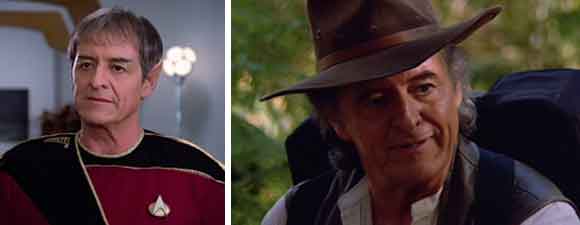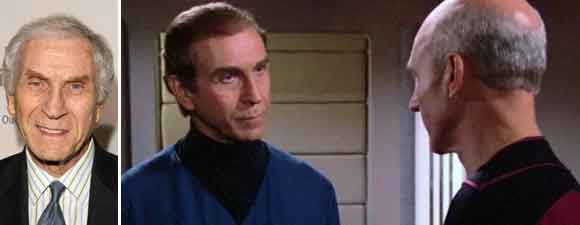Retro Review: Cause and Effect
6 min readThe Enterprise is caught in a time loop, causing the crew to experience deja vu as they relive again and again the events leading up to the ship’s destruction.
Plot Summary: In the midst of a ship-wide crisis, the Enterprise explodes with all hands aboard. An indeterminate amount of time later, Beverly Crusher has a sense of deja vu during a poker game and correctly surmises that Riker is bluffing. Called to sickbay to examine LaForge, who got dizzy in engineering, she feels deja vu again, and as she is falling asleep, she hears disembodied voices. At a staff meeting, she reports these incidents, but the ship continues on its course in the uncharted Typhon Expanse, where it encounters a spatial distortion from which a Soyuz-class starship emerges on collision course with the Enterprise. Riker suggests decompressing the main shuttle bay while Data recommends using the tractor beam to push the other ship aside. Picard follows Data’s advice, but the ships collide and the Enterprise’s warp core breeches, causing an explosion. Again, after an indeterminate amount of time, Crusher is playing poker with Riker, who knows that she is going to call his bluff and like her can guess which cards will be dealt next. The events play out with small variations once again, and the next time, Crusher anticipates the disembodied voices and has them recorded. When Data slows down the recording, he realizes that the voice are the crew in the midst of a terrible crisis. In addition, Crusher discovers that LaForge’s dizzinesss is being caused by echoes of images in his VISOR. The two realize that the ship has become trapped in a causality loop in which they repeat the same several hours endlessly. Data theorizes that he can send himself a brief message using the same field distortions that has created their deja vu. When the collision occurs once more, Data quickly programs a signal before the ship blows up. When the cycle begins with the card game, Crusher again predicts which cards will be dealt, but she is incorrect: they are all threes. Data encounters many other instances of the number three as the repeating events unfold. When Picard decides to follow Data’s advice rather than Riker’s during the crisis, Data glances at the three pips on Riker’s collar and surmises that “three” was meant to tell himself to follow Riker’s suggestion rather than his own. He decompresses the shuttle bay, which pushes the Enterprise away from the other starship. Picard answers the hail from the USS Bozeman and learns that, while the Enterprise was caught in the time loop for 17 days, the Bozeman was trapped for 90 years.
Analysis: “Cause and Effect” is a perfectly constructed bottle show, beginning literally with a bang and never letting up in intensity even though it is certainly the most repetitive episode of Star Trek ever filmed. Writer Brannon Braga has sometimes been accused – by me as well as others – of neglecting character development in favor of sci-fi zaniness, but “Cause and Effect” proves that he has a terrific ear for the Next Gen crew’s voices and can sustain interest in the day-to-day living aspects of being on the Enterprise, not just the outer space thrills. A lot of the pleasure of the episode lies in repetitions of mundane moments, with small changes in each iteration, not unlike the routine of daily life. When Crusher first says that she feels like she’s been at this poker game before, the others assume she means the week before, rather than that specific game with those specific cards. The disruptions to those routines – a set of mysterious symptoms, a shattered glass – draw her attention to the fact that something isn’t right, even before she understands that her deja vu isn’t a gut feeling but a response to a space-time phenomenon. It’s nice to see her making scientific deductions so quickly; when the storyline isn’t medical, she and Troi often end up talking about people’s feelings while LaForge and Data manage the tech talk. And it’s nice to get a few glimpses into her life, to see that she still tends to flowers when she’s not on duty and she still considers Jean-Luc the best friend to call on when she’s troubled. Plus she reads Riker as well as Troi does, at least at the poker table.
Speaking of Riker, he’s an easy character to take for granted; he doesn’t have a VISOR or positronic circuits that can cause problems, he isn’t part-alien, he isn’t one of the technical wizards, and full responsibility for the crew does not rest on his shoulders, so we tend to see him at this point primarily as a competent first officer with the occasional alien entanglement. So I think it’s worth noting not only that he saves the lives of everyone on the crew and gets them out of the time loop – his suggestion, not the android’s, proves to be the effective way to move the ship out of danger – but that whenever Picard asks for suggestions, he’s right there speaking up, though Picard overrules him more than half the time (the count this episode is no on reversing course to avoid whatever sets off the causality loop, yes on running a level three diagnostic in case that’s what they’re trying to tell themselves with the number three, no on decompressing the shuttle bay until Data figures out that Riker’s suggestion must be the way to go. Riker never seems to take anything personally – not Crusher’s ability to read his bluffs, not Data’s rejecting his logic, not Worf’s growling – and he seems to get along with everyone, no matter where they fall in the chain of command.
Jonathan Frakes directed this perfectly paced episode in addition to playing the unsung hero, so I thought I’d sing a bit. It’s a scenario that succeeds in moments, like the slight change in angles when we see the poker game for the second time, the different degrees of close-up on LaForge in Sickbay, the shift in perspective each time the ship blasts apart. So subtle are the developments that when Data deals a different card than we’re expecting, it feels like a huge action scene has begun. The level of tension is particularly remarkable since the story begins with the worst-case scenario and plays it over and over; each time we see the Enterprise explode must feel a bit less shocking and might be a bit less interesting if we weren’t anxious to see what would happen when the loop started over. Because the episode is only an hour, we don’t see all seventeen days of reiteration, only the times when breakthroughs occur, which makes it easier to accept that they reach the same conclusions more quickly the more times the cycle plays out. Troi doesn’t sense anything unusual, which suggests that whatever is going on isn’t affecting subjective emotions; skeptical Worf admits that he is experiencing nIb’poH, the Klingon equivalent of deja vu. We know before the crew does that they’re caught in a time loop, but we don’t know the solution any better than they do until Data hits upon the idea of sending himself a signal.
I love the intimacy of this episode, the intense focus on different friendships and professional relationships, even the in-jokes concerning the Bozeman’s captain, Morgan Bateson (played by Cheers star Kelsey Grammer, who as Frasier on that series once speculated about how interesting it would be to be frozen and wake up in the year 2278, which is when the Bozeman became trapped). But I think we all know better now than to want to play poker with Data, now that we know he can stack the deck with threes and three-of-a-kinds while he shuffles. And it’s worth considering that although Data may be perfectly logical, Riker is both a better poker player and the guy who figured out how to save the ship.






